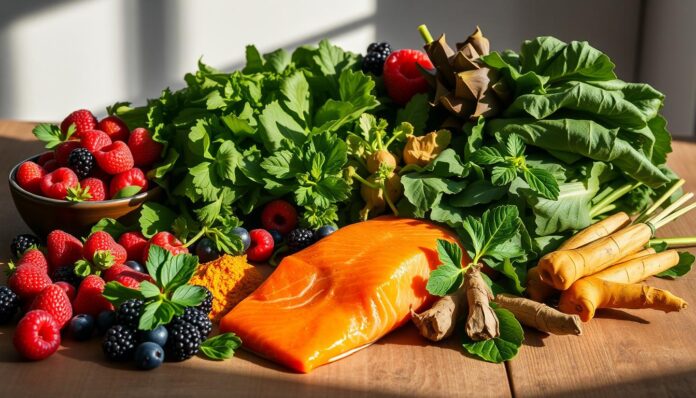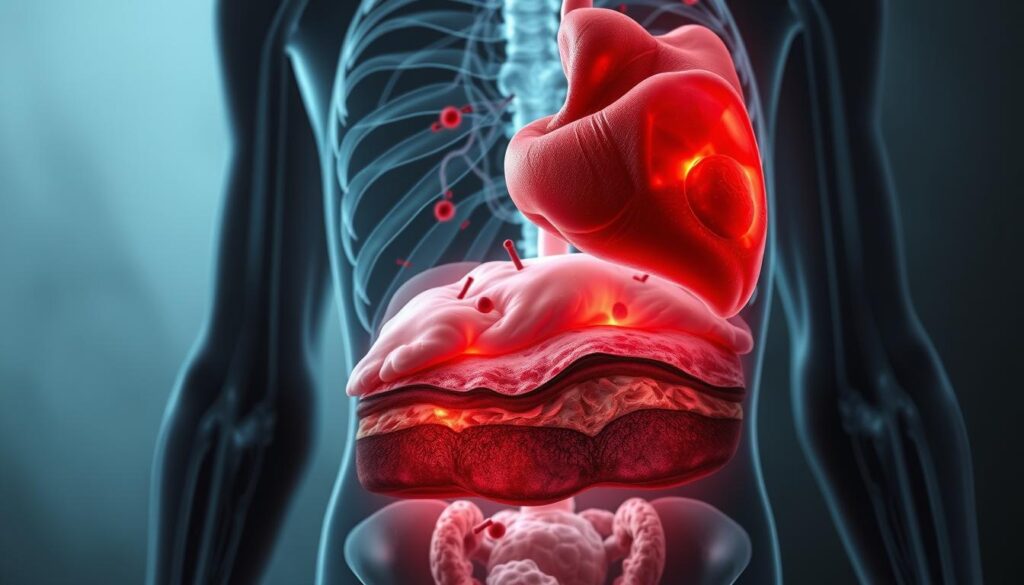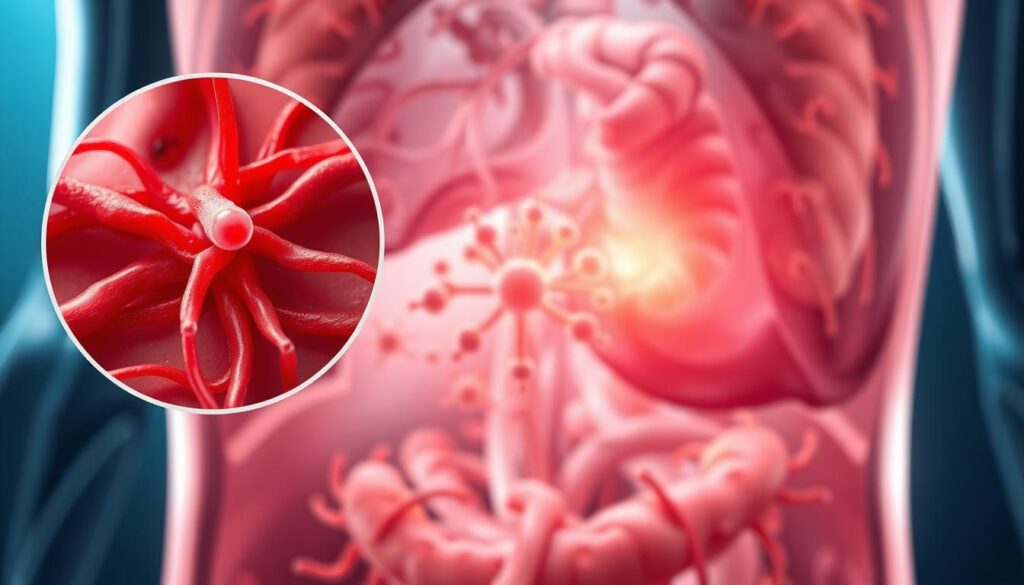Have you ever thought about how your food choices might cause inflammation in your body? It’s key to know that what you eat affects your body’s inflammation. Inflammation is a natural defense but can be harmful if it lasts too long. We’ll look at foods that fight inflammation and how an anti-inflammatory diet can improve your health.
Get ready to learn about the top foods that reduce inflammation. These foods can make your meals healthier and boost your well-being.
Key Takeaways
- Understanding the role of inflammation and its risks is key for your health.
- What you eat can either add to or fight inflammation.
- Choosing an anti-inflammatory diet can make you healthier overall.
- Some foods are great at fighting inflammation.
- Making smart food swaps can make your meals better and your health improve.
Understanding Inflammation
Learning about inflammation is key to keeping healthy. It’s how your body reacts to injury or infection. You might see redness, swelling, pain, and heat. This process is important for healing, but it can be complex.
What is Inflammation?
Inflammation is a natural defense when your body meets harm. Acute inflammation is quick, happening after an injury. It usually goes away as you heal. But chronic inflammation lasts long, leading to serious health problems.
Types of Inflammation
Inflammation comes in two types: acute and chronic. Acute inflammation is short, helping your body heal fast. Chronic inflammation lasts long, causing health issues like heart disease and autoimmune disorders.
Health Risks of Chronic Inflammation
Chronic inflammation can harm your health. It’s linked to heart disease, type 2 diabetes, and some cancers. Eating foods rich in antioxidants can help reduce inflammation. This is discussed more in nutrition management strategies.
What Causes Inflammation?
Understanding what causes inflammation is key to managing health issues. Diet and lifestyle play big roles in how much inflammation you have. Each one affects your health and well-being.
Dietary Contributors to Inflammation
Your diet greatly affects inflammation levels. Foods high in added sugars, trans fats, and refined carbs can cause inflammation. Processed meats, sugary drinks, and refined grains are common culprits.
But, eating whole, nutrient-rich foods can help lower inflammation. For tips on a healthy diet, check out this resource.
Lifestyle Factors
Other than diet, your lifestyle choices also impact inflammation. Stress, not enough exercise, poor sleep, smoking, and too much alcohol can all increase inflammation. Changing your diet and lifestyle can help reduce inflammation.
Regular exercise, managing stress, and getting enough sleep are important. They help keep your body in balance.
Foods That Promote Inflammation
Knowing which foods cause inflammation is key to a healthy diet. Some foods can make inflammation worse in your body. By avoiding these foods, you can eat better.
Common Inflammatory Foods to Avoid
Many foods we eat daily can lead to inflammation. Cutting these out might lower inflammation markers. Here are some foods to steer clear of:
- Red and processed meats
- Sugary snacks and beverages
- Refined carbohydrates like white bread and pastries
- Trans fats in many fast foods
Impact of Processed Foods on Inflammation
Processed foods often have hidden sugars and unhealthy fats. These can raise inflammation levels. Always check food labels. Choosing whole, less processed foods is better for your health.
By avoiding processed foods, you might see less inflammation and better health.
| Food Type | Inflammation Impact |
|---|---|
| Red Meat | High in saturated fats leading to inflammation |
| Sugary Foods | Elevates blood sugar and inflammatory markers |
| Processed Snacks | Often contains trans fats and refined sugars |
| White Bread | Refined carbs cause spikes in blood sugar |
Anti-Inflammatory Foods List
Adding anti-inflammatory foods to your diet can boost your health. Knowing which nutrients fight inflammation is key. This section will cover these nutrients and the benefits of plant-based foods.
Key Nutrients That Fight Inflammation
Many nutrients help fight inflammation. Omega-3 fatty acids, found in salmon, walnuts, and flaxseeds, are very important. They help lower inflammatory markers.
Vitamins A, C, and E, along with minerals like zinc and magnesium, also help your immune system. Polyphenols in berries, green tea, and dark chocolate have strong antioxidant effects. They help stop inflammatory processes.
Benefits of Plant-Based Foods
Plant-based foods are full of health benefits. They are rich in antioxidants, fiber, and phytochemicals. These work together to lower inflammation and improve health.
Eating more fruits, vegetables, whole grains, and legumes can help manage inflammation. Switching to a plant-based diet is good for your health and the planet.
| Nutrient | Food Sources | Benefits |
|---|---|---|
| Omega-3 Fatty Acids | Fatty fish, walnuts, flaxseeds | Reduces inflammation, lowers risk of chronic diseases |
| Vitamins | Citrus fruits, leafy greens, nuts | Boosts immune system, promotes healing |
| Polyphenols | Berries, green tea, dark chocolate | Provides antioxidant protection, minimizes oxidative stress |
| Fiber | Whole grains, legumes, fruits | Supports gut health, reduces inflammatory markers |
Foods to Reduce Inflammation
Learning about foods that fight inflammation can greatly improve your health. Many foods are packed with compounds that help reduce inflammation. Adding these anti-inflammatory foods to your diet is a simple way to care for your health.
Top Inflammation-Fighting Foods
To fight inflammation, choose foods rich in nutrients. Some of the best options are:
- Fatty fish like salmon and mackerel, full of omega-3 fatty acids.
- Turmeric, with its curcumin, offers strong anti-inflammatory benefits.
- Extra virgin olive oil, rich in healthy fats and antioxidants.
- Leafy greens like spinach and kale, full of vitamins and minerals.
- Nuts, like walnuts and almonds, provide essential fatty acids and vitamins.
- Berries, such as blueberries and strawberries, are rich in antioxidants called flavonoids.
- Spices like ginger, known for their anti-inflammatory and digestive benefits.
Incorporating Anti-Inflammatory Foods into Your Diet
To get the most from anti-inflammatory foods, try simple swaps in your meals. Swap processed snacks for nuts to increase healthy fats. Choose whole grains over refined ones to boost fiber and nutrients. Start adding more fruits and vegetables to your meals. This will make your plates colorful and full of nutrients, supporting your health.
Omega-3 Fatty Acids and Their Role
Knowing how important omega-3 fatty acids are can really help your health. These fats are key in fighting inflammation in your body. It’s important to find good sources and know how they affect inflammation.
Sources of Omega-3s
Many foods are full of omega-3 fatty acids, adding good stuff to your diet. Here’s a list of top sources:
| Food Source | Omega-3 Content (grams per serving) | Additional Nutritional Benefits |
|---|---|---|
| Salmon | 4.0 | High in protein and vitamin D |
| Walnuts | 2.5 | Rich in antioxidants |
| Flaxseeds | 2.4 | High fiber content |
| Chia Seeds | 5.0 | Excellent source of calcium |
Impact on Inflammation Levels
The effect of omega-3s on inflammation is huge. They help lower inflammation markers in your body. Research shows they can cut down C-reactive protein (CRP), a sign of inflammation. Eating omega-3s regularly can lower the risk of chronic inflammation, improving your health.
The Power of Antioxidants
Adding antioxidants to your diet is key to fighting inflammation and boosting health. Vitamin C is a standout for its many benefits. You can make your meals better by adding fruits and veggies full of antioxidants. These nutrients fight off harmful free radicals and lessen oxidative stress.
Vitamin C and Its Benefits
Vitamin C is a strong antioxidant that boosts your immune system and cuts down inflammation. You can find it in many fruits and veggies, like oranges, lemons, strawberries, and bell peppers. These foods give you vitamin C and help you eat a balanced diet. Eating foods high in vitamin C can help you live a healthier life and lower disease risks.
Polyphenols and Their Effects on Health
Polyphenols are important antioxidants with anti-inflammatory effects. You can find them in berries, green tea, and dark chocolate. These foods can make your diet better and improve your health. To learn more about adding these nutrients to your meals, check out a guide on how to create a balanced diet that meets your health goals.
Gut-Healthy Foods and Inflammation
A strong link exists between gut health and body inflammation. Eating gut-healthy foods can greatly improve your health. It’s key to know about probiotics and prebiotics for a balanced gut and less inflammation.
Importance of Probiotics and Prebiotics
Probiotics and prebiotics are vital for gut health. Probiotics, found in yogurt and kefir, add good bacteria to your gut. They help control inflammation. Prebiotics, in foods like garlic and bananas, feed these good bacteria, boosting gut health and lowering inflammation.
Fermented Foods for Reducing Inflammation
Eating fermented foods can greatly help reduce inflammation. Foods like kimchi and kombucha are full of probiotics that improve gut health. Eating these foods regularly feeds your microbiome and lowers body inflammation, improving your overall health.
How to Create an Anti-Inflammatory Meal Plan
Making a good anti-inflammatory meal plan means choosing wisely. It’s key to swap out foods that cause inflammation. This way, your meals can help lower inflammation and boost your health.
Healthy Substitutions for Inflammatory Foods
Here are some smart swaps for your diet:
- Switch white bread for whole grain to get more fiber.
- Use olive oil instead of butter for healthier fats.
- Choose sweet potatoes over French fries for more nutrients.
- Go for brown rice or quinoa over white rice for extra vitamins.
Sample Meal Ideas for an Anti-Inflammatory Diet
Adding variety to your meals keeps your diet interesting. Here are some ideas:
- Breakfast: Begin with a berry smoothie with spinach, berries, and almond milk.
- Lunch: Have a salmon salad with greens, cherry tomatoes, and lemon-olive oil dressing.
- Dinner: Try a quinoa bowl with roasted veggies, chickpeas, and tahini.
- Snack: Enjoy nuts or hummus with carrot sticks.
These changes and meal ideas can lead to a healthier life. With every meal, you can choose foods that support your health and taste great.
Conclusion
Choosing an anti-inflammatory diet is more than a quick fix. It’s a long-term choice for better health. Eating foods that fight inflammation can greatly improve your health. It also lowers the risk of chronic diseases.
Starting a balanced diet is a journey, not a rush. Slowly adding healthy foods to your meals can bring lasting benefits. Include lots of fruits, veggies, whole grains, and healthy fats in your diet.
Reducing inflammation is an ongoing process. It leads to more energy and strength. By picking the right foods, you’re setting yourself up for a healthier life. You’re embracing a lifestyle that fights inflammation.






